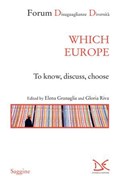Between 6 and 9 June, the polls will be open across Europe to elect the new European Parliament. The parties are warming up their engines: choosing names, putting forward candidates, thinking up tactics. And the manifestos? The wind of nationalism and the widespread resistance to believing in and fighting for a real alternative in almost all the member states risk leading to proposals that are narrow-minded, timid in facing the challenges of the dual transition, digital and environmental; ambiguous, at best, towards migrants; inadequate to counter the new world disorder, wars and the many inherited injustices. Faced with this scenario, the Forum on Inequality and Diversity has decided to speak up. It is not a descent into the electoral arena. It is an examination of some traits of the European Union that could serve social and environmental justice, an informative and committed contribution, a yardstick to judge – before and after the elections – manifestos, parties, candidacies and elected representatives, a compass for the civic monitoring of the actions that the Union will carry out in the next legislature.
This was the incipit of this book back at the end of March 2024. Many of our pre-election concerns turned out to be founded. Electoral results were quite different from country to country, partly depending on whether the far right had already moved ahead in previous elections, partly due to other reasons. The previous President of the European Commission was reelected on the basis of Guidelines that are full of ambiguities, lack any analysis of the previous failures, offer “more of the same” under new titles, does not tackle the growing social inequalities, have no proposal on how to enact a more participatory governance and to make knowledge and Big Data a true common good; all of this under the dark shade of the defeatist statement that we live “in the era of rearmament”, with “defense spending” becoming the number one priority. In this context, many people in Europe look at the European Parliament as the democratic place where any issue can be transparently debated, serious mistakes can be avoided and some steps forward can be made. This is why this book, its assessments and proposals, can be of use as a tool for elected representatives and a yardstick to judge them. The Union advocated in this book is a place where universal welfare is promoted rather than penalized by austerity; where knowledge and data are accessible and available to communities; where ecological transformation is accelerated in the interest first and foremost of the most vulnerable people to achieve a fairer way of life and work; and where public policies and governance are democratized. A Europe that becomes aware of its fundamental role in migration processes and acts as a builder of cooperation and peace.

